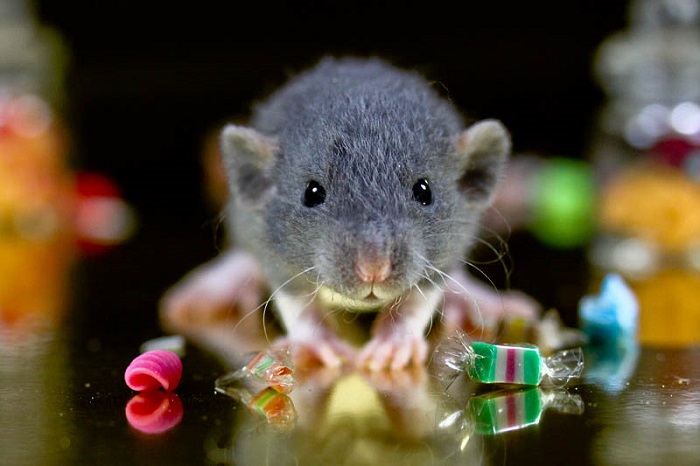Parent-of-origin effects help determine how lab rats respond to stress.
Although your father and mother each contribute a copy of your genes, these copies don’t always play equal roles. Instead, one parent’s gene can have a disproportionate effect on the offspring’s phenotype, resulting in complex patterns of inheritance. In G3: Genes|Genomes|Genetics, Mont et al. examined such effects in the behavior of lab rats.
One example of parent-of-origin effects (PoE) is genomic imprinting, a phenomenon in which only either the maternal or paternal allele of a gene is expressed. Imprinting is associated with a range of developmental and behavioral phenotypes in mammals, and disruption of certain imprinted genes can cause human diseases like Prader-Willi, Angelman, and Beckwith-Wiedemann syndromes.
Although a great deal of work has been done on PoE in mice, much less is understood in rats, which show more complex behaviors. Thus, the authors began their study with a broad assessment of 199 phenotypes in a large cross of rats for which parental information was available. To look for potential examples of PoE, they developed a way to separate out the portion of trait variance that was dependent on inheritance in the usual sense—where there is no difference between maternally and paternally inherited alleles—from that which contrasts the mother versus the father. The latter component can arise from several causes, including true PoE, maternal effects (i.e. gene expression in the mother that influenced offspring taits), paternal effects (the equivalent for the father), and environmental effects from sharing a cage with the mother and some of the siblings. If there were no PoE, then values for each parent would be equivalent; however, the authors found that they were different for 86% of the phenotypes assessed.
If imprinted loci are known to be rare, why are these PoE-related effects seemingly so pervasive? The rat results are consistent with experiments done in mice, which also found widespread PoE-like phenomena and suggested that these effects may be due in part to the indirect effects of imprinted loci—that is, the effects of imprinting can ripple through the genome to trigger many additional phenotypic consequences.
Of particular note, the authors found that coping behaviors—how the animals reacted to stress—showed some of the most significant differences between maternal and paternal contributions, which is suggestive of PoE. However, confounding variables, such as dominance, can also generate PoE, so further experimentation was required to confirm this finding.
To test for PoE related to coping behaviors, the authors crossed two rat strains: RHA and RLA. Stressed RHA rats tend to display active behaviors, such as fleeing, whereas RLA rats tend to be passive when stressed, either freezing or self-grooming. These behaviors were assessed in the offspring of reciprocal crosses using the elevated zero maze, in which rats are placed in a ring-shaped elevated platform with alternating open and walled sections. The rats are then observed for anxiety-like behaviors around the open sections, since rats prefer closed spaces when they are exploring a new environment. The behavior of offspring in the maze tended to fit the behavior profile of the maternal strain: rats with RHA mothers and RLA fathers exhibited more active behavior (matching their RHA mothers), and vice versa.
The authors suggest that these differences might be due to known differences in epigenetic modifications on neurotransmitter receptor genes in the two rat strains, although further research is needed to define the exact mechanism for this phenomenon.
CITATION:
Coping-Style Behavior Identified by a Survey of Parent-of-Origin Effects in the Rat
Carme Mont, Polinka Hernandez Pilego, Toni Cañete, Ignasi Oliveras, Cristóbal Río-Álamos, Gloria Blázquez, Regina López-Aumatell, Esther Martínez-Membrives, Adolf Tobeña, Jonathan Flint, Alberto Fernández-Teruel, Richard Mott































